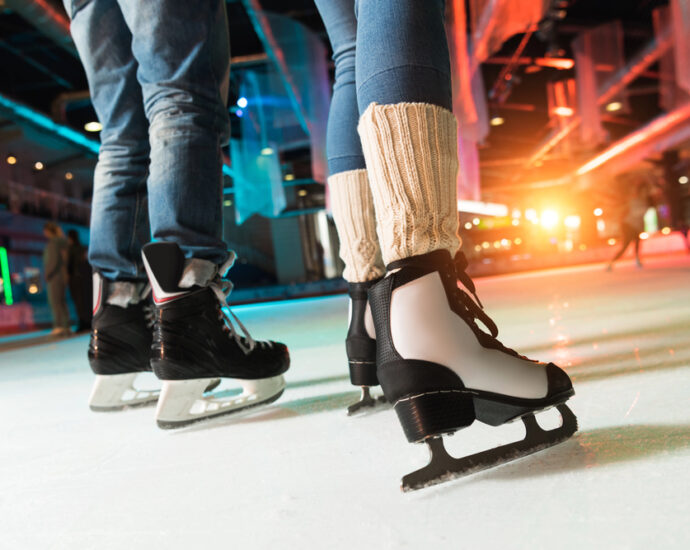Ice skating is more than just a recreational activity or a winter pastime; it’s a full-body workout that offers a wide range of health and fitness benefits. Whether you’re gliding gracefully on a frozen lake or speeding around a rink, ice skating can enhance your physical, mental, and emotional well-being. Here’s an in-depth look at why ice skating is an excellent activity for people of all ages and fitness levels.
-
Page Contents
Cardiovascular Health
Ice skating is a form of aerobic exercise that gets your heart pumping and improves cardiovascular endurance. As you move across the ice, your heart works harder to deliver oxygen to your muscles, helping to strengthen your heart and lungs. Regular ice skating can:
- Lower blood pressure.
- Improve circulation.
- Reduce the risk of heart disease and stroke.
-
Full-Body Workout
One of the unique aspects of ice skating is that it engages almost every muscle in your body. Key areas include:
- Lower Body: The primary movements of ice skating—pushing off and gliding—work your quadriceps, hamstrings, calves, and glutes.
- Core: Maintaining balance on the ice activates your core muscles, including the abdominals and obliques.
- Upper Body: While not as intensive as the lower body, skating also engages the arms and shoulders, especially during turns and stops.
-
Improved Balance and Coordination
Ice skating requires you to maintain stability on a slippery surface, which enhances your balance and coordination over time. These skills are particularly beneficial for:
- Older adults, as they can reduce the risk of falls.
- Athletes, who can translate improved balance into better performance in other sports.
-
Flexibility and Agility
The dynamic movements of ice skating improve flexibility and agility. Skaters often need to bend, stretch, and twist their bodies to perform maneuvers, which can:
- Enhance joint mobility.
- Reduce stiffness.
- Lower the risk of injuries in daily activities or other sports.
-
Weight Management
Ice skating is an excellent way to burn calories and manage your weight. The number of calories burned depends on your intensity level:
- Leisurely skating: 250-500 calories per hour.
- Speed skating or figure skating: 500-900 calories per hour.
Regular ice skating, combined with a healthy diet, can contribute to weight loss or maintenance.
-
Stress Relief and Mental Health Benefits
Like many forms of physical activity, ice skating triggers the release of endorphins, the body’s natural mood elevators. Additionally, the focus required to skate effectively can distract from stressors and promote mindfulness. Benefits include:
- Reduced anxiety and depression.
- Improved mood and emotional resilience.
- Enhanced mental clarity and focus.
-
Social Engagement
Ice skating is often a social activity, whether you’re skating with friends, joining a class, or participating in a hockey league. Social interactions during skating can:
- Strengthen relationships.
- Reduce feelings of isolation.
- Boost self-esteem and confidence.
-
Low-Impact Exercise
For individuals with joint issues or those recovering from injuries, ice skating offers a low-impact alternative to high-impact exercises like running. The gliding motion reduces stress on the joints while still providing a great workout. However, beginners should take precautions to avoid falls that could lead to injury.
-
Enhanced Mental Discipline
Learning and mastering ice skating techniques require focus, determination, and patience. This mental discipline can translate into other areas of life, teaching perseverance and problem-solving skills.
-
Bone and Joint Health
Weight-bearing activities like ice skating can improve bone density and joint strength, reducing the risk of osteoporosis and arthritis. However, proper technique and safety measures are essential to avoid overuse injuries.
-
Benefits for Children
For children, ice skating provides additional developmental benefits:
- Motor Skills: Skating improves hand-eye coordination and fine motor skills.
- Confidence: Mastering new skills on the ice builds self-confidence and a sense of achievement.
- Teamwork: Participating in ice hockey or synchronized skating teaches collaboration and sportsmanship.
Tips for Getting Started
If you’re new to ice skating, follow these tips to maximize the benefits and minimize the risks:
- Wear Proper Gear: Invest in well-fitting skates and protective gear like helmets, especially for beginners or children.
- Warm Up: Stretch and perform light cardio before hitting the ice to prevent injuries.
- Take Lessons: Enroll in a class or hire a coach to learn proper technique and build confidence.
- Start Slowly: Begin with basic movements and gradually progress to more advanced techniques.
- Stay Safe: Skate in designated areas and follow rink rules to avoid accidents.
Ice Skating for Fitness Enthusiasts
For those looking to incorporate ice skating into their fitness routines, consider:
- Interval Training: Alternate between slow and fast skating to boost cardiovascular fitness and calorie burn.
- Strength Drills: Use skating exercises like lunges, squats, and one-legged glides to build strength.
- Cross-Training: Combine skating with other activities like yoga, pilates, or resistance training for a balanced fitness regimen.
Conclusion
Ice skating offers a unique combination of physical, mental, and social benefits that make it an excellent choice for individuals of all ages. Whether you’re gliding for leisure or training for competition, this versatile activity can enhance your health and fitness while bringing joy and excitement to your routine. So lace up your skates and hit the ice—your body and mind will thank you!
READ MORE: Dive into Wellness: The Health Benefits of Water Activities
Sources:
https://icerinkatwestfieldlondon.co.uk/blog/health-benefits-of-ice-skating/
https://www.playkettering.org/health-benefits-ice-skating/
https://www.oxfordcityleisure.com/oxford-ice-rink/news/the-health-benefits-of-ice-skating/
